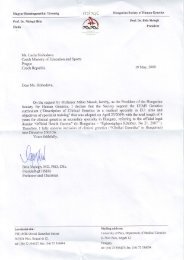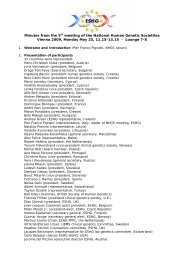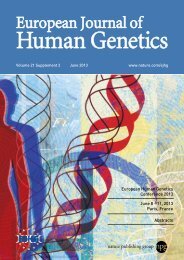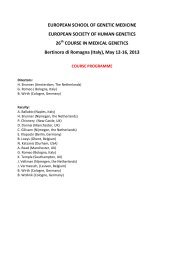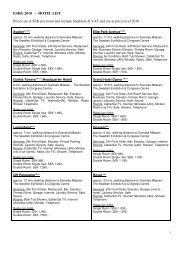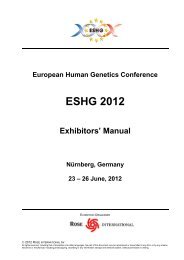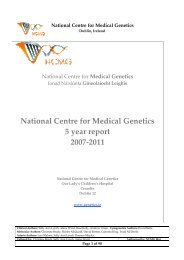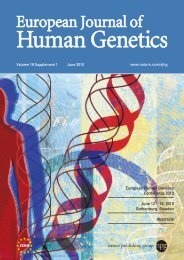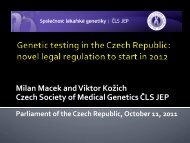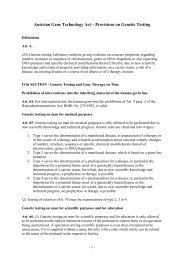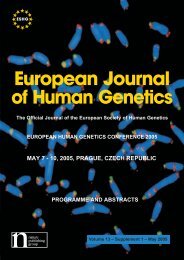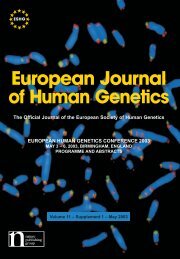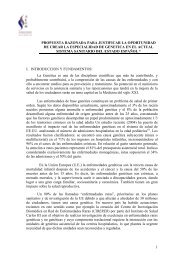2008 Barcelona - European Society of Human Genetics
2008 Barcelona - European Society of Human Genetics
2008 Barcelona - European Society of Human Genetics
You also want an ePaper? Increase the reach of your titles
YUMPU automatically turns print PDFs into web optimized ePapers that Google loves.
EMPAG Posters 0<br />
the family, relatives approached individuals in the generation <strong>of</strong> the<br />
deceased man, regardless <strong>of</strong> their risk status, who were then responsible<br />
for informing younger relatives . Most people informed by a relative<br />
did not seek genetic counselling . The informing relative may not<br />
have sufficient authority for the information either to be taken seriously,<br />
or to challenge individual constructions about the aetiology <strong>of</strong> cancer .<br />
This impeded information transmission to further at risk relatives . Most<br />
participants knew <strong>of</strong> relatives who had not been told about their cancer<br />
risk .<br />
Research Implications: When recruiting participants to genetics research<br />
studies, consideration should be given to requesting contact<br />
details <strong>of</strong> specific relatives, in the event <strong>of</strong> clinically significant results<br />
becoming available post mortem.<br />
Clinical Implications: The limited efficiency <strong>of</strong> information transfer<br />
among relatives is discussed in the context <strong>of</strong> a potential role for genetics<br />
services in contacting at risk relatives directly .<br />
EP07.2<br />
Exploring family communication after receipt <strong>of</strong> BRCA1/2<br />
results: Early data from family cases<br />
C. Jacobs 1 , M. Wallace 2 , J. Smith 3 , S. Michie 2 ;<br />
1 Guy’s and St Thomas’ NHS Foundation Trust, London, United Kingdom, 2 University<br />
College London, Department <strong>of</strong> Psychology, London, United Kingdom,<br />
3 Birkbeck College, Department <strong>of</strong> Psychology, London, United Kingdom.<br />
Research investigating family communication about test results for the<br />
BRCA1/2 genes has largely been quantitative or limited to investigation<br />
with individuals undergoing testing . Little is known about how test<br />
information is communicated to other family members or received by<br />
them . This study examines how results <strong>of</strong> BRCA1/2 gene mutations<br />
are received by affected index patients and communicated through<br />
the family. The study examines the flow <strong>of</strong> information from clinician<br />
to patient and on to relatives; factors influencing communication; the<br />
impact <strong>of</strong> communication on cognition, emotion, behaviour and family<br />
relationships; and decision-making regarding risk management .<br />
Results consultations with participants are audio-recorded . One month<br />
later, interviews with participants explore their understanding <strong>of</strong>, and<br />
response to, the test result, and the experience <strong>of</strong> communicating this<br />
to first-degree relatives. Similar interviews are then conducted with<br />
relatives recruited by the index patients, with whom results have been<br />
shared . All interviews are recorded, transcribed and analysed .<br />
Early data from family cases will be presented to illustrate the factors<br />
influencing family communication, and the impact <strong>of</strong> communication on<br />
risk perception, emotional state, behaviour and family relationships .<br />
The value <strong>of</strong> these findings both clinically and scientifically will be discussed<br />
.<br />
EP07.3<br />
Active Non-Disclosure in the Familial cancer setting: A case<br />
Report<br />
M. K. Kentwell, M. Harris, G. Lindemann;<br />
Familial Cancer Centre, Royal Melbourne Hospital, Parkville, Australia.<br />
A 77 year old woman unaffected by cancer was shown to carry the<br />
family specific BRCA2 mutation identified in her sister. At the results<br />
disclosure appointment, the client stated she would not inform her four<br />
daughters, aged in their 30s and 40s <strong>of</strong> her positive result .<br />
This presentation will analyse the client and genetic counsellor’s perspective,<br />
and the interaction between the two . Firstly, the reasons why<br />
the client elected not to share her results with her daughters will be<br />
explored . These include perception about effectiveness <strong>of</strong> risk management,<br />
family relationships and communication, perceived receptivity<br />
<strong>of</strong> the daughters regarding genetic information, judgement <strong>of</strong><br />
how the daughters would cope with the knowledge <strong>of</strong> their mother’s<br />
BRCA2 mutation carrier status, the perceived harm which may arise<br />
from disclosure and personal belief in the daughters’ right not to know .<br />
Secondly, from the Genetic Counsellor’s perspective, the counselling<br />
strategies utilised during and following the disclosure appointment will<br />
be outlined. In addition, the discussion will reflect on the challenges<br />
encountered in counselling the client, and the impact <strong>of</strong> a consultation<br />
involving non-disclosure on the Genetic Counsellor . The presentation<br />
will also describe the self-reflection which occurred in attempting to<br />
define the Genetic Counsellor’s role in this case, and the ethical questions<br />
the Genetic Counsellor asked herself around the issue <strong>of</strong> nondisclosure<br />
.<br />
EP07.4<br />
the psychological impact <strong>of</strong> genetic testing <strong>of</strong> symptomatic<br />
patients - A literature review<br />
F. Vansenne, P. M. M. Bossuyt, C. A. J. M. de Borgie;<br />
Academic Medical Centre, Amsterdam, The Netherlands.<br />
At present more and more genetic risk factors are identified to explain<br />
the development <strong>of</strong> common disease . As a consequence an increasing<br />
number <strong>of</strong> genetic tests are becoming available to clinicians . To<br />
guide the appropriate use and clinical utility <strong>of</strong> genetic tests it is important<br />
to consider the psychological impact <strong>of</strong> testing . In this study we<br />
performed a literature review to evaluate the psychological impact <strong>of</strong><br />
genetic testing and its measurement in symptomatic patients .<br />
We completed a systematic literature search from 1966 to april 2007 .<br />
Relevant studies were identified from searches <strong>of</strong> Medline, Embase<br />
and Psychinfo databases . Additionally we searched for recent overview<br />
articles and relevant reports and in the Health Technology Assessment<br />
and Dare database . Prospective studies, evaluating genetic<br />
testing in symptomatic patients (n≥20) and using at least one standardized<br />
psychological outcome were included and evaluated .<br />
In total 1233 studies were identified. After abstraction <strong>of</strong> information 17<br />
studies were eligible and independently assessed . In half <strong>of</strong> the studies<br />
all participants were female, diagnosed with breast and/or ovarian<br />
cancer . Socio-demographics were comparable between the studies .<br />
Methodology used to measure the impact <strong>of</strong> genetic testing, protocols,<br />
and psychological outcome definitions differed substantially among<br />
the reviewed studies .<br />
Little research has been conducted to support the feasibility on when<br />
and how to evaluate the psychosocial impact <strong>of</strong> genetic testing in<br />
symptomatic patients . Because <strong>of</strong> discordant results and short-term<br />
follow-up it is uncertain whether patients experience long-term negative<br />
psychosocial consequences <strong>of</strong> genetic testing . This important<br />
clinical evaluation question should be addressed in future research .<br />
EP08. Predictive testing: process and<br />
impact<br />
EP08.1<br />
Decision making for young adults in predictive genetic testing<br />
K. M. Mattingley1 , G. Betts2 , M. Freckmann1 , R. Sachdev1 ;<br />
1 2 Clinical <strong>Genetics</strong>, St George Hospital, Sydney, Australia, Sydney Children’s<br />
Hospital, Sydney, Australia.<br />
In recent years a number <strong>of</strong> articles have discussed the predictive testing<br />
process in minors and young adults . A young individual’s ability to<br />
make an informed and responsible decision regarding predictive testing<br />
and the potential harm this may cause has been a contentious issue . A<br />
more recent view (1) argues that assessment <strong>of</strong> the individual’s maturity<br />
<strong>of</strong> judgement in the decision making process, should be a consideration<br />
in predictive genetic testing protocols for minors . Should this not also<br />
be applied to young adults? Not all adults by the nature <strong>of</strong> their age are<br />
‘mature’ in their decision making ability . Cognitive but also psychosocial<br />
factors influence decision making whether in adolescence or adulthood.<br />
Legally ‘mature’ by age may not mean cognitive or psychosocial maturity<br />
and can result in immature decision making . Should we then deny young<br />
adults who don’t have a mature outlook access to testing? The case <strong>of</strong><br />
three sisters, 18 to 22 years <strong>of</strong> age, at 50% risk for Huntington disease<br />
and their journey through the predictive testing process is presented and<br />
discussed .<br />
1 . Richards, FH . (2006) Maturity <strong>of</strong> judgement in decision making for<br />
predictive testing for nontreatable adult-onset neurogenetic conditions: a<br />
case against predictive testing <strong>of</strong> minors . Clinical <strong>Genetics</strong> 70: 396-401 .<br />
EP08.2<br />
Accurately assessing uptake <strong>of</strong> predictive testing for Huntington<br />
disease.<br />
R. J. Tassicker;<br />
Genetic Health Services Victoria, Parkville, Australia.<br />
The current literature fails to provide an accurate calculation for the<br />
uptake <strong>of</strong> predictive testing for Huntington disease. Uptake figures are<br />
reported from several centres based on the total number <strong>of</strong> people<br />
who have undertaken predictive testing as a percentage <strong>of</strong> those estimated<br />
to be at 50% risk in their catchment area . This method produced



